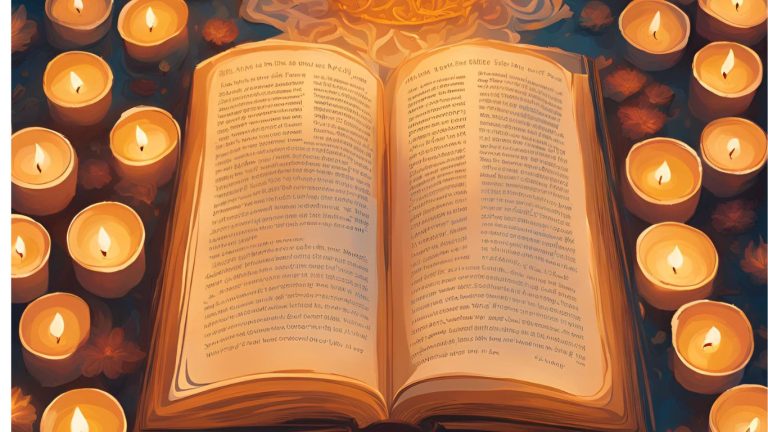Shri gita Chapter 2: The Yoga of Knowledge (Sankhya Yoga)
1. Sanjaya said: Seeing Arjuna full of compassion and very sorrowful, his eyes brimming with tears, Madhusudana, Krishna, spoke the following words.
2. The Supreme Lord said: O Arjuna, how has this illusion overcome you at this crucial moment? This is not befitting a man who knows the value of life. It is degrading and will lead to infamy.
3. O son of Pritha, do not yield to this degrading impotence. It does not become you. Give up such petty weakness of heart and arise, O chastiser of the enemy.
4. Arjuna said: O Madhusudana, how can I counterattack with arrows in battle men like Bhishma and Drona, who are worthy of my worship?
5. It would be better to live in this world by begging than to live at the cost of the lives of great souls who are my teachers. Even though desiring worldly gain, they are superiors. If they are killed, our spoils will be tainted with blood.
6. Nor do we know which is better—conquering them or being conquered by them. The sons of Dhritarashtra, whom if we killed we should not care to live, are standing before us on this battlefield.
7. Now I am confused about my duty and have lost all composure because of weakness. In this condition, I am asking You to tell me for certain what is best for me. Now I am Your disciple, and a soul surrendered unto You. Please instruct me.
8. I can find no means to drive away this sorrow which is drying up my senses. I will not be able to dispel it even if I win a prosperous, unrivaled kingdom on earth with sovereignty like the demigods in heaven.
9. Sanjaya said: Having thus spoken, Arjuna, chastiser of enemies, told Krishna, “Govinda, I shall not fight,” and fell silent.
10. O descendant of Bharata, at that time, Krishna, smiling in the midst of both armies, spoke the following words to the grief-stricken Arjuna.
The Immortal Nature of the Soul
11. The Supreme Lord said: While you speak words of wisdom, you are mourning for that which is not worthy of grief. Those who are wise lament neither for the living nor for the dead.
12. Never was there a time when I did not exist, nor you, nor all these kings; nor in the future shall any of us cease to be.
13. Just as the embodied soul continuously passes, in this body, from boyhood to youth to old age, so does it pass into another body at death. The self-realized soul is not bewildered by such a change.
14. O son of Kunti, the nonpermanent appearance of happiness and distress, and their disappearance in due course, are like the appearance and disappearance of winter and summer seasons. They arise from sense perception, O scion of Bharata, and one must learn to tolerate them without being disturbed.
15. O best among men, the person who is not disturbed by happiness and distress and is steady in both is certainly eligible for liberation.
16. Those who are seers of the truth have concluded that of the non-existent (the material body) there is no endurance, and of the eternal (the soul) there is no change. This they have concluded by studying the nature of both.
17. That which pervades the entire body is indestructible. No one is able to destroy the imperishable soul.
18. The material body of the indestructible, immeasurable, and eternal living entity is sure to come to an end; therefore, fight, O descendant of Bharata.
19. Neither he who thinks the living entity the slayer nor he who thinks it slain is in knowledge, for the self slays not nor is slain.
20. For the soul there is neither birth nor death at any time. He has not come into being, does not come into being, and will not come into being. He is unborn, eternal, ever-existing, undying, and primeval. He is not slain when the body is slain.
21. O Partha, how can a person who knows that the soul is indestructible, eternal, unborn, and immutable kill anyone or cause anyone to kill?
22. As a person puts on new garments, giving up old ones, the soul similarly accepts new material bodies, giving up the old and useless ones.
23. The soul can never be cut to pieces by any weapon, nor burned by fire, nor moistened by water, nor withered by the wind.
24. This individual soul is unbreakable and insoluble, and can be neither burned nor dried. He is everlasting, all-pervading, unchangeable, immovable, and eternally the same.
25. It is said that the soul is invisible, inconceivable, and immutable. Knowing this, you should not grieve for the body.
26. If, however, you think that the soul is perpetually born and always dies, still you have no reason to lament, O mighty-armed.
27. For one who has taken his birth, death is certain; and for one who is dead, birth is certain. Therefore in the unavoidable discharge of your duty, you should not lament.
28. All created beings are unmanifest in their beginning, manifest in their interim state, and unmanifest again when annihilated. So what need is there for lamentation?
29. Some look on the soul as amazing, some describe him as amazing, and some hear of him as amazing, while others, even after hearing about him, cannot understand him at all.
30. O descendant of Bharata, he who dwells in the body can never be slain. Therefore you need not grieve for any living being.
Duty of a Warrior (Kshatriya)
31. Considering your specific duty as a Kshatriya, you should know that there is no better engagement for you than fighting on religious principles; and so there is no need for hesitation.
32. O Partha, happy are the Kshatriyas to whom such fighting opportunities come unsought, opening for them the doors of the heavenly planets.
33. If, however, you do not perform your religious duty of fighting, then you will certainly incur sins for neglecting your duties and thus lose your reputation as a fighter.
34. People will always speak of your infamy, and for a respectable person, dishonor is worse than death.
35. The great generals who have highly esteemed your name and fame will think that you have left the battlefield out of fear only, and thus they will consider you a coward.
36. Your enemies will describe you in many unkind words and scorn your ability. What could be more painful for you?
37. O son of Kunti, either you will be killed on the battlefield and attain the heavenly planets, or you will conquer and enjoy the earthly kingdom. Therefore, get up and fight with determination.
38. Do thou fight for the sake of fighting, without considering happiness or distress, loss or gain, victory or defeat—and by so doing, you shall never incur sin.
The Path of Knowledge and Selfless Action
39. Thus far I have declared to you the analytical knowledge of Sankhya philosophy. Now listen to the knowledge of yoga, whereby one works without fruitive result. O son of Pritha, when you act in such knowledge, you can free yourself from the bondage of works.
40. In this endeavor, there is no loss or diminution, and a little advancement on this path can protect one from the most dangerous type of fear.
41. Those who are on this path are resolute in purpose, and their aim is one. O beloved child of the Kurus, the intelligence of those who are irresolute is many-branched.

